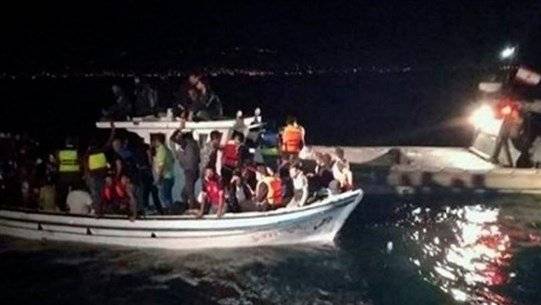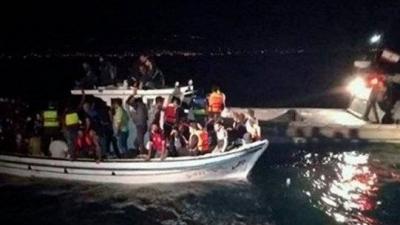Two full months have passed since the sinking of the "Death Boat" off the coast of Tripoli, Lebanon, which was carrying over 70 people. Nevertheless, dozens of missing individuals remain at the bottom of the sea, at a depth of 470 meters where the vessel sank, and Lebanese authorities have been unable to recover it. Meanwhile, families are waiting to retrieve the bodies of their loved ones. The news regarding the submarine brought by a Lebanese association in Australia to recover the bodies is followed by the families with little hope and much skepticism, surprised by the repeated delays in its arrival date; some believe it, while others think they will never be able to bury their loved ones.
Adel Dandachi struggles to tell the story of how he lost his three sons in the "Death Boat" while attempting to migrate with his family from Tripoli towards Europe on that vessel on April 23. His surviving wife, unable to speak, remains silent. Adel tells "Asharq Al-Awsat": "I can no longer look at the sea or get close to it. We do not talk about what happened because it is beyond our capacity to bear. Our lives are a real hell, we do not sleep, eat, or drink, and we suffer from psychological disturbances. They burned our hearts and deprived us of hearing the words 'Papa' and 'Mama.' They are monsters." Adel and his wife miraculously survived drowning but lost all their children: Asad (40 days old), Jawad (8 years old), and Fida (5 years old). Those children are still among the missing, along with dozens of others. Adel tried to save his son but was unsuccessful. A few days ago, he dreamt of his missing daughter Fida crying for help. He went frantic, rented a boat, and headed out with the coast guard to search for her but found nothing. "When I saw her, I lost my mind and went crazy; my love for her is indescribable." His eyes well up with tears, and he struggles to continue speaking. He cannot believe that he and each of his siblings have lost a daughter and that there are no surviving daughters left.
The army was able to rescue 45 people after the incident and retrieved six bodies. Estimates suggest that 23 people still remain submerged in the water off the shores of Tripoli. The major tragedy fell upon the Dandachi family, who live in the Rifa area of Tripoli. On the boat were Adel, his wife, their children, and his two brothers, Bilal and Raed. Raed survived but lost his wife and daughter Ghazal, and his son's body, Bahaa, was found. The third brother, Bilal, also survived but lost his wife and their two children, Laith and Razan. Seven children from one family and their wives, along with other relatives, raise the number of Dandachi family victims to ten.
Adel Dandachi, who communicates with the authorities on behalf of the victims' families, confirms that the awaited submarine to retrieve the vessel along with its occupants was funded by Lebanese emigrants in Australia. The charity sending the submarine operates there and represents an Indian company based in Spain, and it won't reach the shores of Beirut before the 13th of next month.
The delay in arrival frustrates the families of the drowned. A relative of the missing person, Mohammad Al-Hamwi, says: "Every time the arrival date for the submarine gets closer, they delay it again. It’s been two months, and we remain in this state." Mohammad Al-Hamwi boarded the death boat with his two wives, one of whom was pregnant, along with five children; only three survived. The waiting is excruciating. "All we want is to have the bodies of our dead returned to us so we can bury them peacefully,” says Mazen Mundar Taleb (24 years old), who is waiting to retrieve his mother (48 years), father (48 years), older brother (26 years), and younger brother (10 years). He wants to protect the surviving member of his family, so he placed his only surviving brother (12 years old) in the care of his married sister, who was supposed to join them, as they are the last remaining family members, hoping to help him cope psychologically. Mazen, still in shock, says: "My father was the only one who knew the details of the journey. He told us to pack our bags just two hours before we set off. My mother was the most enthusiastic and didn’t object. We wanted to reach Greece and then Italy, and from there, we would manage." Mazen now lives alone in his house after the deaths of his parents and siblings. "I work, but I suffer from asthma and cannot afford my medicine. My father had high blood pressure and went to the hospital several times, but we couldn't find him medicine; the goal was to reach a safe country."
Many of those who were on this vessel, including the Taleb and Dandachi families, had been rescued previously from an illegal migration boat carrying 93 passengers, which had a malfunction 23 miles off Tripoli, and their lives were saved in November last year. However, after six months, they tried their luck again, and the catastrophe occurred.
The families receive conflicting news. They are confused between what the state confirms—that the boat sank with those still on it—and what they hear from people and their personal analyses. Adel Dandachi states: "After the incident, we swam and tried to save ourselves for two hours. During that time, I heard familiar voices, including the Taleb family; I recognized the husband and wife by their Palestinian accent. If they drowned while swimming, then where are their bodies? I saw many people swimming around me, and their bodies were never found." He adds, "After we buried the six we found, we gathered for their funeral; all of Tripoli was here. There is a lot of mystery. Perhaps the state has forcibly hidden the bodies, either to facilitate the elections or for another reason. After emotions have cooled, they will extract our children from the refrigerators and say, 'Come collect them.'"
Families are skeptical of everything; shock makes them disbelieve what they are told, especially given the many rumors. Adel explains: "After we buried the six we found, we heard that the body of Mundar Taleb was found in Amchit, but that news was denied. Then we heard that the body of the missing Huriya was found in Shekka, so were they really found and their bodies hidden?" The Al-Mulaj family has also heard that their son was rescued and taken to the government hospital, but they didn’t find him there. Mohammad Al-Samakh is said to have been seen rescuing drowning victims, but he has also not been found. The pain is greater than the truth, and the families are in deep shock, but death boats continue to sail, and their traders have not repented, especially since the desperate continue to grow like mushrooms, and nothing can curb their desire to seek salvation.




